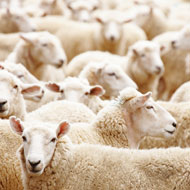Maedi Visna disease on the rise

Signs of Maedi Visna are not usually seen until around half the sheep in a flock are infected.
Vets from Scotland's Rural College (SRUC) are warning that many commercial sheep flocks could be threatened by a rise in the incurable viral disease Maedi Visna (MV).
Testing by the college has identified a worrying number of infected flocks, suggesting that infection is spreading throughout the sector.
In the majority of cases screening was performed in flocks where there were suspicions of MV infection and in 23 per cent (seven of the 31 flocks tested) these suspicions proved to be correct. The owners of the six flocks had reported signs such as lameness and swollen joints, and breathlessness in adult sheep.
SRUC say that as signs of the disease are not usually seen until around half the sheep in a flock are infected, it is likely these flocks have a high level of infection.
Maedi Visna is a chronic disease caused by a retrovirus and was introduced to the UK through imported animals. Difficult to diagnose and highly contagious, MV can lead to poor body condition, increased mastitis, poorer fertility, smaller, weaker lambs and increased deaths. There is no vaccination or cure.
Lynn Gibson, SRUC veterinary investigation office, said: "This means the clinical signs can take years to develop by which time one single animal can have spread infection through the flock. The first indications of a problem can include an increase in barren ewes or the numbers of thinner sheep meaning more are being culled from the flock as unproductive.”
“Sheep never develop immunity to MV and with no effective treatment or cure the only option with heavily infected flocks is to depopulate and restock from reliable sources.
“We recommend any flock owners finding they have ewes which have lost condition since tupping (mating) time should check for MV. It is something to take seriously, not ignore. Disease in sheep flocks reduces productivity and income in a sector already operating on narrow margins.”
SRUC suggest that concerned sheep farmers should target test 12 older, thinner animals using the MV diagnostic test to indicate if losses are due to the disease. If sheep are showing ill-thrift or reacting badly to exercise, then a similar approach should be taken.



 HMRC has invited feedback to its communications regarding the employment status of locum vets and vet nurses.
HMRC has invited feedback to its communications regarding the employment status of locum vets and vet nurses.